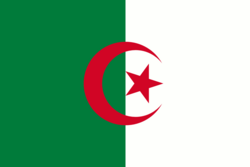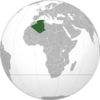Algeria Energy Situation
Overview
| People's Democratic Republic of Algeria | |||
| |
| ||
|
Capital |
Algiers (36°42′N 3°13′E) | ||
|
Official language(s) |
Arabic | ||
|
Government |
Semi-presidential republic | ||
|
President |
Abdelaziz Bouteflika | ||
|
Prime Minister |
Ahmed Ouyahia | ||
|
Total area |
2,381,741 km2 | ||
|
Population |
35,423,000 (2010 estimate) | ||
|
GDP (nominal) |
$158.969 billion | ||
|
GDP Per capita |
$4,478 | ||
|
Currency |
Algerian dinar (DZD) | ||
|
Time zone |
CET (UTC+01) | ||
|
Calling code |
+213 | ||
Algeria is located in North Africa and is bordering Tunisia and Libya in the east, Niger and Mali in the south, and Mauritania, Western Sahara, and Morocco in the west. In the north, Algeria’s vast coast of over 1.200 km extends to the Mediterranean Sea. Being part of the Maghreb, Algeria is furthermore considered to be a part of the MENA-region. With its more than two million km2 of national territory, Algeria is by far the largest North African country. However, most of its national territory is being occupied by the Sahara, which thus explains the population of roughly 33 million people.[1] This is also expressed in the arrangement of population density: 90% of the population is located in the north.[2] The mild Mediterranean climate coming from the coast is being replaced by a dry desert climate while moving south. The official language is Arabic, although French can be considered to be a common lingua franca, whereas in some areas Berber dialects can be common as well.[3] Having a parliament that consists of a national assembly and a senate, Algeria is a republic with Abdelaziz Bouteflika, who has been reelected with 90.2% of votes in 2009,[3] as its president since 1999.[1] Ethnic groups are made up of a vast majority of Arab-Berber (99%). However, most Algerians identify themselves with their Berber heritage rather than their Arab one.[3] The state religion is Sunni Muslim, likewise represented by a vast majority, while Christians and Jews make up less than 3% of the population.[1]
Minerals that can be found in this region are amongst others oil, gas, iron, and lead.[2] Together with agricultural goods, they make up the majority of export goods. Furthermore, they are the reason, why Algeria is part in international economic conglomerates, such as the OPEC or the OAPIC. Algeria’s gross domestic product (GDP) has been constantly rising in the last couple of years, bringing it to the approximate amount of $160 billion in 2010. The GDP per capita is hence about $7.3.[3]
Algeria has a number of transnational issues to deal with, including an international dispute with the Moroccan administration of Western Sahara and illegal schemes in form of smuggling, human trafficking and forced labor.[3]
Energy situation
Type your text here
Energy Supply
Type your text here
Electricity
Type your text here
Energy Consumption
Type your text here
Energy demand
Type your text here
Electricity
Type your text here
Access rate
Type your text here
Market situation for different energy technologies and services
Solar Energy
Type your text here
Wind Energy
Type your text here
Biomass
Type your text here
Biogas
Type your text here
Hydro Power
Type your text here
Other renewable Sources
Type your text here
Key problems of the energy sector
Type your text here
Policy framework, laws and regulations
Type your text here
General Energy policy, Energy strategy
Type your text here
Important Laws and regulations
Type your text here
Specific strategies (Biomass, renewable energies, rural electrification, energy access strategy etc.)
Type your text here
Institutional set up in the energy sector
Type your text here
Governmental institutions Private sector (enterprises, NGOs)
Type your text here
Activities of other donors, activities of NGOs
Type your text here
Existing projects
Type your text here
Further Reading
Type your text here
External links
Reference list
- ↑ 1.0 1.1 1.2 Auswärtiges Amt (German Ministry of Foreign Affairs), Last Updated: October, 2010, Access: September 16, 2011, URL: http://www.auswaertiges-amt.de/DE/Aussenpolitik/Laender/Laenderinfos/01-Nodes_Uebersichtsseiten/Algerien_node.html
- ↑ 2.0 2.1 Deutsche Außenhandelskammer (German Chamber of Foreign Trade - AHK), Last Updated: 2011, Access: September 16, 2011, URL: http://algerien.ahk.de/algerien/
- ↑ 3.0 3.1 3.2 3.3 3.4 Central Intelligence Agency (CIA) - World Factbook, Last Updated: August 23, 2011, Accessed: September 16, 2011, URL: https://www.cia.gov/library/publications/the-world-factbook/geos/ag.html





















